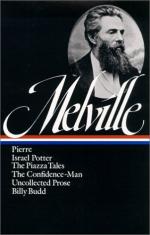The peace immediately filled England, and more especially London, with hordes of disbanded soldiers; thousands of whom, rather than starve, or turn highwaymen (which no few of their comrades did, stopping coaches at times in the most public streets), would work for such a pittance as to bring down the wages of all the laboring classes. Neither was our adventurer the least among the sufferers. Driven out of his previous employ—a sort of porter in a river-side warehouse—by this sudden influx of rivals, destitute, honest men like himself, with the ingenuity of his race, he turned his hand to the village art of chair-bottoming. An itinerant, he paraded the streets with the cry of “Old chairs to mend!” furnishing a curious illustration of the contradictions of human life; that he who did little but trudge, should be giving cosy seats to all the rest of the world. Meantime, according to another well-known Malthusian enigma in human affairs, his family increased. In all, eleven children were born to him in certain sixpenny garrets in Moorfields. One after the other, ten were buried.
When chair-bottoming would fail, resort was had to match-making. That business being overdone in turn, next came the cutting of old rags, bits of paper, nails, and broken glass. Nor was this the last step. From the gutter he slid to the sewer. The slope was smooth. In poverty—“Facilis descensus Averni.”
But many a poor soldier had sloped down there into the boggy canal of Avernus before him. Nay, he had three corporals and a sergeant for company.
But his lot was relieved by two strange things, presently to appear. In 1793 war again broke out, the great French war. This lighted London of some of its superfluous hordes, and lost Israel the subterranean society of his friends, the corporals and sergeant, with whom wandering forlorn through the black kingdoms of mud, he used to spin yarns about sea prisoners in hulks, and listen to stories of the Black Hole of Calcutta; and often would meet other pairs of poor soldiers, perfect strangers, at the more public corners and intersections of sewers—the Charing-Crosses below; one soldier having the other by his remainder button, earnestly discussing the sad prospects of a rise in bread, or the tide; while through the grating of the gutters overhead, the rusty skylights of the realm, came the hoarse rumblings of bakers’ carts, with splashes of the flood whereby these unsuspected gnomes of the city lived.
Encouraged by the exodus of the lost tribes of soldiers, Israel returned to chair-bottoming. And it was in frequenting Covent-Garden market, at early morning, for the purchase of his flags, that he experienced one of the strange alleviations hinted of above. That chatting with the ruddy, aproned, hucksterwomen, on whose moist cheeks yet trickled the dew of the dawn on the meadows; that being surrounded by bales of hay, as the raker by cocks and ricks in the field; those glimpses of garden produce, the blood-beets,




